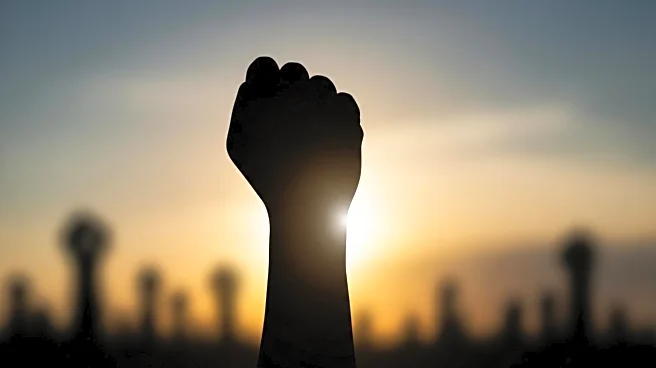What's Happening?
The article discusses the warnings about the rise of fascism in American culture, drawing on the insights of Toni Morrison from a speech given in 1995. Morrison highlighted the gradual steps leading to fascism, such as inventing enemies and pathologizing them, which resonate with current political dynamics. The piece also examines the role of Black history as a narrative of resistance against fascism and racism, emphasizing the importance of belief, resistance, and faith in overcoming authoritarian threats. Morrison's analysis suggests that fascism is deeply rooted in American culture, intertwined with racism, and not confined to any single political party.
Why It's Important?
The exploration of Black history as a form of resistance is crucial in understanding the broader societal impacts of fascism and racism. It underscores the ongoing struggle for justice and equality, highlighting the resilience and contributions of Black Americans in shaping democratic ideals. The article suggests that recognizing these historical narratives can inform contemporary efforts to combat authoritarianism and promote social progress. It also challenges the notion that political change alone can eradicate fascism, urging a deeper examination of cultural and systemic factors.
What's Next?
The article implies that continued vigilance and active resistance are necessary to counteract fascist tendencies. It calls for multifaceted approaches to resistance, including legal, educational, and cultural strategies. The piece suggests that individuals and communities must remain engaged in defending democratic values and promoting diversity, equity, and inclusion. The role of faith and cultural expression, such as music, is highlighted as powerful tools in sustaining resistance and inspiring hope.
Beyond the Headlines
The article delves into the ethical and cultural dimensions of resistance, emphasizing the importance of faith and belief in overcoming systemic oppression. It explores how Black Americans have historically used faith as a means of empowerment and survival, offering a profound perspective on the intersection of religion, culture, and political activism. This deeper analysis invites reflection on the enduring legacy of resistance and the potential for transformative change.









